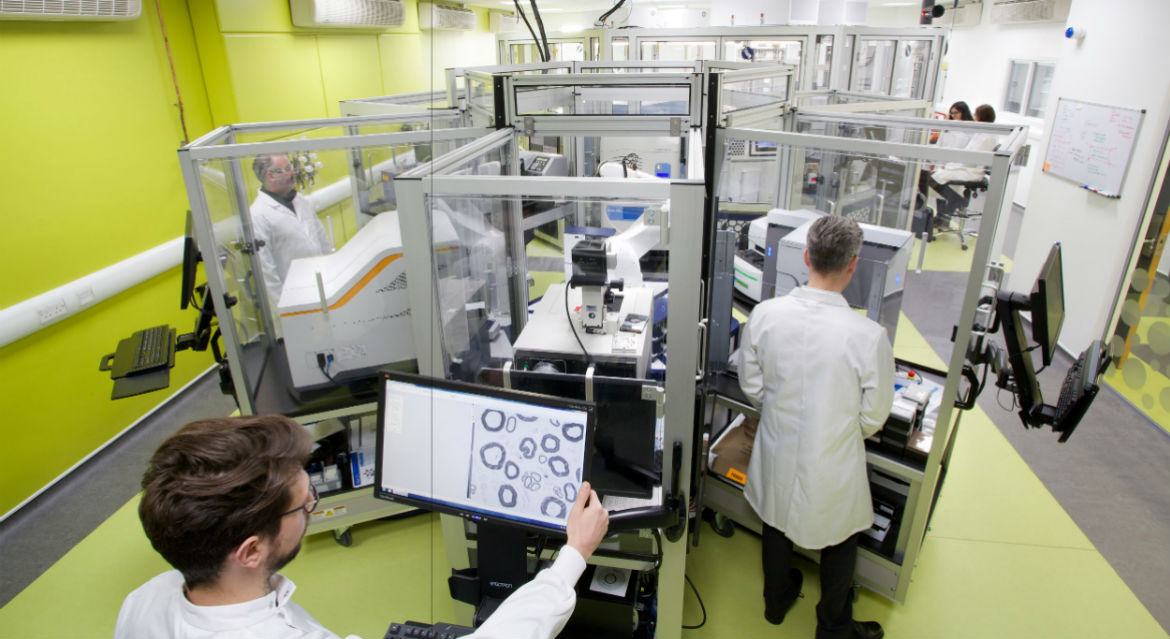Seeding tomorrow’s priority medicines
Published On Thu 2 May 2019 by Roddy Isles

The University of Dundee will share in a new €36.5million, European-wide grant for the European Lead Factory, a public-private partnership to transform drug targets into new medicines.
The European Lead Factory (ELF) has secured a total project budget of EUR 36.5 million under the second framework of the Innovative Medicines Initiative (IMI). Over the next 5 years, 20 partners in 7 countries, including the University of Dundee, will push forward the transformation of potential drug targets to new medicines in the new project ESCulab (European Screening Centre: unique library for attractive biology) under the European Lead Factory brand.
Universities, research organisations and SMEs have a diverse range of potential drug targets but cannot easily access suitable compound libraries and screening facilities. Pharmaceutical companies need access to high quality targets to bring innovative therapies to the patient.
The European Lead Factory combines the large high-quality compound libraries derived from the pharmaceutical industry and the Public Compound Collection and Europe’s leading screening facility with the innovative targets held by academic organisations in a public-private partnership. This offers an ideal platform to translate early-stage fundamental biological research into credible and investable starting points for drug discovery campaigns.
The National Phenotypic Screening Centre (NPSC), based within the School of Life Sciences at the University of Dundee, is part of the project and provides brings expertise in developing and screening complex biological assays using “high content” phenomics technology.
Dr Paul Andrews, Director of Operations at the NPSC, said, “By employing quantitative microscopy or flow cytometry to measure a range of disease-relevant responses in cells, our approach has the potential to accelerate the development of safer and more effective medicines.”
Dundee will receive around €1.3million for the NPSC’s contribution over the course of the project.
Jon de Vlieger, coordinator of the ESCulab consortium at Lygature, commented, “It’s truly exciting to continue the onboarding of new and innovative proposals for screening and provide high quality starting points for drug discovery to academics and SMEs throughout Europe. In an effort to broaden our scope we are not only looking for target-based approaches, but now also enable phenotypic screens.”
Stefan Jaroch, project lead of Bayer AG, confirms that, “the European Lead Factory has clearly shown how crowd sourcing and collective intelligence can indeed advance biological concepts into drug discovery projects that benefit academia, industry, society and ultimately patients.”
Over the next five years,the European Lead Factory will initiate 185 new drug discovery projects by screening medically relevant drug targets from European researchers, small and medium-sized enterprises and pharmaceutical industry against the ELF library of 550,000 unique chemical compounds.
The successful concept of the European Lead Factory has already encouraged additional private partners to join. The ESCulab Project welcomes the two pharmaceutical companies Servier and Grünenthal as well as the Medicines for Malaria Venture (MMV), the leading product development partnership in the field of antimalarial drug research and development.
Tim Wells, Chief Scientific Officer at MMV, adds: “We are thrilled to participate as ESCulab and the European Lead Factory represent a chance for new partnerships for MMV, both with the EU through IMI and with a variety of highly creative companies. These partnerships give access to a novel, high quality chemical library that we believe is important to be screened against high priority malaria targets.”
About the European Lead Factory
The European Lead Factory is a pan-European platform for drug discovery that is giving a major boost to drug discovery in Europe by connecting innovative drug targets to a high-quality compound library and high-throughput screening facilities.
Please visit www.europeanleadfactory.eu to learn more about collaborative drug discovery.
About the National Phenotypic Screening Centre (NPSC)
NPSC is a world-class facility for automated, high content, phenotypic screening. The goal of the NPSC is to bring advances in industrial drug screening capabilities to academic investigators. NPSC is a partnership between the Universities of Dundee, Edinburgh and Oxford. The project was established with an £8M infrastructure award from the Scottish Funding Council to the Scottish Universities Life Science Alliance (SULSA). NPSC operates as an open centre and aims to collaborate globally to develop the physiologically-relevant assays from biologists who are keen to achieve impact by seeing their best research ideas translated from the lab into the drug discovery pipeline. Learn more at www.npsc.ac.uk
About the University of Dundee – School of Life Sciences
With more than 900 scientists, research students and support staff from 61 countries and external funding in excess of £50 million per annum, the School of Life Sciences at the University of Dundee is one of the largest and most productive Life Sciences research institutes in Europe. The University of Dundee is the central hub for a multi-million-pound biotechnology sector in the east of Scotland, which now accounts for 16% of the local economy. Learn more at www.lifesci.dundee.ac.uk
Acknowledgement of support
This project has received funding from the Innovative Medicines Initiative 2 Joint Undertaking under grant agreement No. 806948: ‘ESCulab: European Screening Centre; Unique Library for Attractive Biology’. This Joint Undertaking receives support from the European Union’s Horizon 2020 research and innovation programme, European Federation of Pharmaceutical Industries and Associations and the Medicines for Malaria Venture.
For media enquiries contact:
Roddy Isles
Head of Corporate Communications
University of Dundee
Nethergate, Dundee, DD1 4HN
Tel: +44 (0)1382 384910
Mobile: 07800 581902
Email: r.isles@dundee.ac.uk